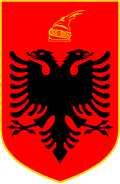 |
|---|
The Judiciary of Albania interprets and applies the law of Albania. Albania's judicial system is a civil law system divided between courts with regular civil and criminal jurisdiction and administrative courts. Albanian law is codified and based on the French law. It is governed by the High Council of Justice (Këshilli i Lartë i Drejtësisë), and its management is aided by the office of the President of Albania, the Ministry of Justice, and the various courts chairpersons.
Contents
- Hierarchy
- Law "On the transitional re-evaluation of judges and prosecutors in the Republic of Albania."
- See also
- References
The judiciary is defined under the Constitution (Kushtetuta) and Law with a hierarchical structure, with the Constitutional Court (Gjykata Kushtetuese) and the Supreme Court (Gjykata e Lartë) at the apex. The District Courts (Gjykatat e Rrethit Gjyqësor) are the primary trial courts, and the Courts of Appeal (Gjykatat e Apelit) are the primary appellate courts.
The judiciary faces many problems and a widespread lack of confidence but is making progress in recent times. There have been serious violations of the accepted separation of powers doctrine, systematic attempts to undermine trials, problems with access to justice, problems with court infrastructure and financial support, and corruption. [1] But the 2016 Judicial System Reform aims to reform the system and bring upon a fairer and more efficient administration, a strengthening of the rule of law, the vetting and cleansing of the system of corrupt judges, etc. [2]

